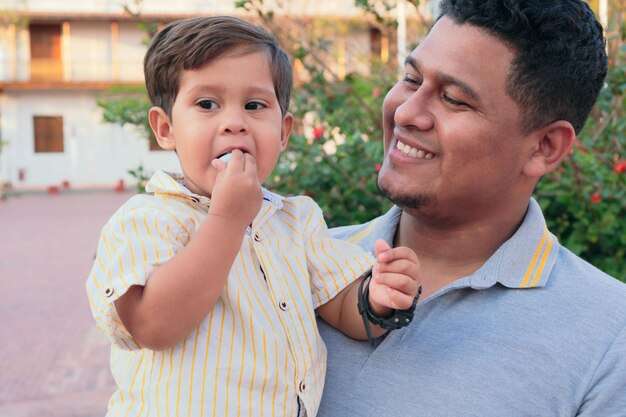Early Childhood Development
Essential Tips and Tricks for New Dads

Health and Development
Is my baby eating enough? “A well-fed baby usually seems satisfied, gains weight steadily, and produces around six wet diapers a day. If you’re concerned, check with your pediatrician for guidance on feeding patterns.”
What if my baby won’t stop crying? “Persistent crying can be distressing; try soothing your baby with gentle rocking, singing, or a warm bath. If the crying continues, consult your pediatrician to rule out any health issues.”
How can I tell if my baby is developing normally? “Each baby grows at their own pace, but general milestones include smiling by 2 months and babbling by 6 months. Discuss any development concerns with your pediatrician during regular check-ups.”
How do I baby-proof my home? “Start by securing furniture that can tip over, covering outlets, and installing gates on stairs. Regularly check each room for small objects and other hazards as your baby grows.”
How much sleep should my baby be getting? “Newborns typically need 14-17 hours of sleep a day spread over several naps and nighttime. Sleep patterns will evolve as your baby grows, so adapt routines accordingly.”
Feeding and Nutrition
Breastfeed or formula feed? “Both breastfeeding and formula feeding provide essential nutrients for your baby’s growth. Choose what best fits your family situation, and consult your pediatrician for advice tailored to your baby’s needs.”
How often should I feed my newborn? “Newborns usually need to be fed every 2-3 hours, but be attentive to their cues for hunger, such as fussing or sucking motions, as some might need more frequent feeding.”
Signs of food allergies in infants? “Watch for symptoms like hives, eczema, vomiting, or diarrhea after feeding. If you suspect an allergy, consult your pediatrician for testing and dietary adjustments.”
When to introduce solid foods? “Solid foods can typically be introduced around 6 months when your baby can sit upright and show interest in food. Start with simple purees and gradually introduce variety.”
Healthy snack options for toddlers? “Opt for whole, minimally processed snacks like sliced fruits, vegetable sticks with hummus, yogurt, or small pieces of cheese. These provide good nutrition and are easy for small hands to manage.”
Emotional and Mental Well-being
Dealing with feeling overwhelmed as a new dad? “It’s normal to feel overwhelmed; ensure you take time for yourself and discuss your feelings with your partner or a friend. Don’t hesitate to seek support from a counselor if needed.”
Effective ways to bond with my baby? “Frequent skin-to-skin contact, talking to your baby, and participating in feeding and bath time are great ways to strengthen your bond.”
Supporting my partner postpartum? “Be actively involved with the baby and household responsibilities, and provide emotional support by listening and offering encouragement, which can significantly alleviate postpartum stress.”
Handling postpartum depression? “If you suspect you or your partner might be experiencing postpartum depression, it’s important to speak openly about it and seek professional help from a healthcare provider.”
Balancing work and a new baby? “Create a realistic schedule that includes dedicated family time, and if possible, explore flexible work arrangements. Prioritize tasks and don’t hesitate to ask for help from family or friends.”
Sleep
Techniques to help my baby sleep through the night? “Establish a consistent bedtime routine with calming activities like a warm bath and quiet storytime. Make sure the sleep environment is comfortable and conducive to sleeping.”
Is co-sleeping safe? “The American Academy of Pediatrics recommends room-sharing without bed-sharing for safety. Use a crib or bassinet in your room for the safest setup.”
Establishing a bedtime routine for my baby? “Start with predictable nightly rituals like a light massage, soft music, and dim lights to signal it’s time to sleep, helping your baby wind down and understand bedtime cues.”
What if my baby has sleep regression? “Sleep regression is common and usually temporary. Maintain a consistent bedtime routine and ensure your baby’s daytime needs for food and activity are met.”
How much sleep should a new dad get? “Try to get at least 6-8 hours of sleep, though it may be interrupted. Sync your sleep schedule with your baby’s to maximize rest.”
Healthcare
When should my baby see a doctor? “Schedule regular wellness check-ups and immunizations as recommended by your pediatrician. Additionally, consult a doctor if your baby shows signs of illness or unusual behavior.”
What vaccinations will my baby need? “Follow the immunization schedule recommended by your pediatrician, which typically includes vaccines for diseases such as measles, mumps, rubella, and whooping cough.”
Choosing the right pediatrician? “Look for a pediatrician with whom you feel comfortable discussing your concerns and who shares your views on healthcare. Recommendations from friends and family can also be helpful.”
Common infant illnesses to watch out for? “Be aware of common issues like colds, fever, diarrhea, and rashes. Consult your pediatrician if symptoms appear severe or don’t improve with basic care.”
Taking care of my baby’s dental health? “Begin cleaning your baby’s gums with a soft cloth before teeth arrive, and use a baby toothbrush once teeth appear. Schedule a first dental visit by the age of one or when the first tooth is visible.”